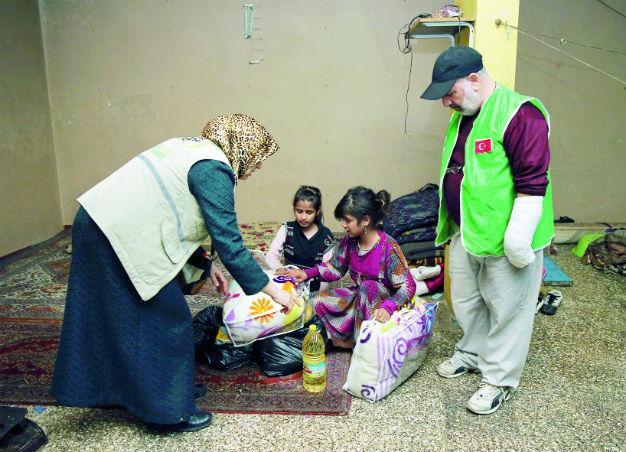EU unlocks first tranche of refugee aid in Turkey
BRUSSELS

AA photo
The European Union has begun funding projects to meet the needs of Syrian refugees hosted inside Turkey and activated on March 4, 95 million euros out of the 3 billion euros the EU pledged last year to fund facilities for refugees.The European Commission said in a statement on March 4 that 55 million euros would be spent to make sure Syrian school children get access to education, while 40 million euros would be spent on humanitarian aid through the World Food Program in collaboration with the Turkish Red Crescent.
“[The] children of Syrian refugees in Turkey need access to formal education so that they can hope to build a normal life in the future,” state-run Anadolu Agency reported Johannes Hahn, European commissioner for enlargement and neighborhood policy, as saying on March 4 while visiting refugee camps in southeast Turkey.
“[They] will benefit from additional humanitarian funding through the Facility for Refugees in Turkey,” he added.
The announcement came just days ahead of a Turkey-EU summit set to focus on collaboration over the worst refugee crisis Europe has faced since World War II.
Under last fall’s refugee action plan, the EU pledged 3 billion euros in funding to meet the needs of Syrian refugees in Turkey, visa liberalization for Turkish citizens and speeding up the EU candidate country’s accession process in exchange for Turkey stemming the flow of Syrian refugees coming in to Europe via Greece.
On the same day, Dutch Prime Minister Mark Rutte said he was “cautiously optimistic” that Turkey would agree at the EU summit on March 7 to take back non-Syrian refugees.
“We hope we can reach an agreement with Turkey on taking back economic migrants, the non-Syrian refugees,” said Rutte, whose country holds the rotating presidency of the 28-nation bloc, Reuters reported.
The European Commission set out a timetable on March 4 to restore the fraying 26-nation Schengen open border area by year-end, warning that failure to do so would cost the European economy up to 18 billion euros ($19.7 billion) a year.
It proposed no new measures, but told European Union countries to abide by existing EU law and stop the “wave through” approach that has led to a million migrants and refugees marching north through the Balkans from Turkey through Greece.
“Schengen is our unity,” the EU’s migration commissioner, Dimitris Avramopoulos, said. “We cannot have free movement internally if we cannot manage our external borders effectively.”
The United Nations refugee agency proposed a six-point plan to EU heads of state on March 4 to resolve the migrant crisis, warning that the situation was quickly deteriorating in Greece, where some 30,000 refugees are stuck.
The proposal included setting up EU centers in each state to “take responsibility for all of Europe for registering people and distributing them under an agreed system,” UNHCR spokeswoman Melissa Fleming told a briefing in Geneva.
UNHCR Europe bureau director Vincent Cochetel said 400,000 Syrian refugees in Turkey should be resettled around the world to help ease the burden on the country.
Cochetel said the refugees could be distributed from Turkey over the next two years, and he called on Europe, Russia and the United States to do more.
Hours later, a spokesperson for German Chancellor Angela Merkel said that resettling refugees from Turkey to Europe would not be at the top of the summit’s agenda.
The summit will prioritize where the EU is in terms of protecting its external borders and how it can help Greece, spokesperson Christiane Wirtz told a regular government news conference.
“The redistribution of refugees themselves is not [at the] top of the list because the other points are necessary requirements first before we can pursue this point,” she said.
















